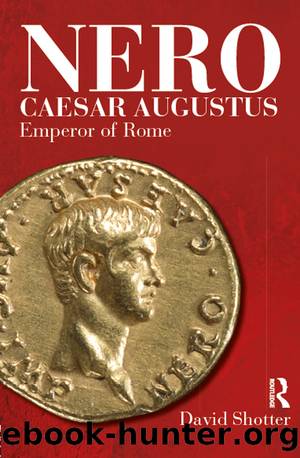Nero Caesar Augustus by David Shotter

Author:David Shotter [Shotter, David]
Language: eng
Format: epub
Tags: History, Ancient, General, Europe
ISBN: 9781317865902
Google: n8C3AwAAQBAJ
Publisher: Routledge
Published: 2014-06-03T16:14:21+00:00
Chapter Eight
* * *
The Beginning of the End
Tacitus brought the fourteenth book of his Annals to a close on an ominous note:1 by recounting Octaviaâs banishment and then her cruel and brutal death, the historian points up the sudden savagery of an Emperor who, although previously far from faultless, had generally refrained from such barbaric cruelty. The new depths that Nero now plumbed were symbolised2 by the decapitation of Octavia and the presentation of the severed head to Poppaea Sabina. Even more depressing was the fact that the Senate greeted such an act with lavish expressions of gratitude, recalling the level of sycophancy that had once exasperated the Emperor, Tiberius,3 and was to have the same effect on Neroâs successor, Galba.4
It has been observed5 that Nero was not previously noted for excessive cruelty, despite his sometimes rash and reckless conduct. The murder of Agrippina was shocking because it was an act of matricide, although aspects of it, assuming that they were not subsequently invented, were more bizarre than gratuitously cruel. Indeed, Neroâs early years as Emperor had seen few deaths that were unequivocally attributable to him. Besides Agrippina, the most obvious cases were those of Britannicus (if, indeed, he was murdered), Faustus Sulla and Rubellius Plautus; all of these Nero plainly came to regard with increasing anxiety as possible rivals and, in the cases of the latter two, he had at first tried to obviate those fears by exiling the two men. Again, although many had criticised the character â particularly the lack of dignity â of Neroâs games and shows, he had concentrated on artistic and athletic contests, and had not allowed fights to the death.6 Indeed, Neroâs games were perfectly consistent with the growing philhellenism of the young Emperor.
There can be little doubt that, despite Senecaâs efforts to inculcate a âproperâ notion of clemency and authority into his pupil, presumably in the hope that he might thus mould him into the âphilosopherkingâ, Neroâs view of clemency was whimsical and essentially selfindulgent, as was highlighted by the trial in AD 627 of Antistius Sosianus for writing scurrilous verses directed at Nero. The Emperor was, of course, well aware, as Seneca reminded him, that he held the power of life and death over his subjects.8 The trial of Antistius9 was of considerable significance for a number of reasons: first, it represented the revival of treason trials that Nero, at the opening of his reign, had promised to abolish. Secondly, on this occasion, the initiator of the charges against Antistius was Cossutianus Capito, the son-in-law of Neroâs new Prefect of the Praetorian Guard, Ofonius Tigellinus. Thirdly, a sycophantic Senate was on the point of endorsing the death-penalty when the outspoken Stoic senator, Publius Clodius Thrasea Paetus, intervened to propose a less drastic course of action. Fourthly, in an ending, that, in some ways, recalls the conclusion of the trial of Marcus Scribonius Libo Drusus, during the reign of Tiberius,10 Nero indicated that, although he was displeased and hurt at Antistiusâ conduct, he would, in any case, have exercised imperial clemency.
Download
This site does not store any files on its server. We only index and link to content provided by other sites. Please contact the content providers to delete copyright contents if any and email us, we'll remove relevant links or contents immediately.
| France | Germany |
| Great Britain | Greece |
| Italy | Rome |
| Russia | Spain & Portugal |
Fanny Burney by Claire Harman(26603)
Empire of the Sikhs by Patwant Singh(23086)
Out of India by Michael Foss(16853)
Leonardo da Vinci by Walter Isaacson(13336)
Small Great Things by Jodi Picoult(7143)
The Six Wives Of Henry VIII (WOMEN IN HISTORY) by Fraser Antonia(5515)
The Wind in My Hair by Masih Alinejad(5095)
A Higher Loyalty: Truth, Lies, and Leadership by James Comey(4964)
The Crown by Robert Lacey(4817)
The Lonely City by Olivia Laing(4802)
Millionaire: The Philanderer, Gambler, and Duelist Who Invented Modern Finance by Janet Gleeson(4478)
The Iron Duke by The Iron Duke(4356)
Papillon (English) by Henri Charrière(4274)
Sticky Fingers by Joe Hagan(4199)
Joan of Arc by Mary Gordon(4112)
Alive: The Story of the Andes Survivors by Piers Paul Read(4033)
Stalin by Stephen Kotkin(3966)
Aleister Crowley: The Biography by Tobias Churton(3640)
Ants Among Elephants by Sujatha Gidla(3467)
